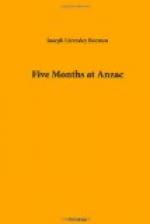Our bearers did great work here, Sergeant Baber being in charge and the guiding spirit amongst them. Carberry from Western Australia proved his worth in another manner. The 4th Brigade were some distance up the gully and greatly in want of water. Carberry seems to have the knack of divining, for he selected a spot where water was obtained after sinking. General Monash drew my attention to this, and Carberry was recommended for the D.C.M.
Early in August, soon after Colonel Manders was killed, I was promoted to his position as Assistant Director of Medical Services, or, as it is usually written, A.D.M.S. On this I relinquished command of the 4th Field Ambulance, and though I appreciated the honour of the promotion yet I was sorry to leave the Ambulance. We had been together so long, and through so much, and every member of it was of such sterling worth, that when the order came for me to join Headquarters I must say that my joy was mingled with regret. Everyone—officers, non-commissioned officers and men—had all striven to do their level best, and had succeeded. With one or two exceptions it was our first experience on active service, but all went through their work like veterans. General Godley, in whose division we were, told me how pleased he was with the work of the Ambulance and how proud he was to have them in his command. The Honour list was quite sufficient to satisfy any man. We got one D.S.O., two D.C.M.s, and sixteen “Mentioned in Despatches.” Many more deserved recognition, but then all can’t get it.
Major Meikle took charge, and I am sure the same good work will be done under his command. Captain Dawson came over with me as D.A.D.M.S. He had been Adjutant from the start until the landing, when he “handed over” to Captain Finn, D.S.O., who was the dentist. Major Clayton had charge of C Section; Captains Welch, Jeffries and Kenny were the officers in charge of the Bearer Divisions. Jeffries and Kenny were both wounded. Captain B. Finn, of Perth, Western Australia, was a specialist in eye and ear diseases. Mr. Cosgrove was the Quartermaster, and Mr. Baber the Warrant Officer; Sergeant Baxter was the Sergeant Clerk. To mention any of the men individually would be invidious. They were as fine a set of men as one would desire to command. In fact, the whole Ambulance was a very happy family, all doing their bit and doing it well.
On the 21st of August an attack was made on what were know as the W Hills—so named from their resemblance to that letter of the alphabet. Seated on a hill one had a splendid view of the battle. First the Australians went forward over some open ground at a slow double with bayonets fixed, not firing a shot; the Turks gave them shrapnel and rifle-fire, but very few fell. They got right up to the first Turkish trench, when all the occupants turned out and retired with more speed than elegance. Still our men went on, taking a few prisoners and getting close to the hills, over which they disappeared from




